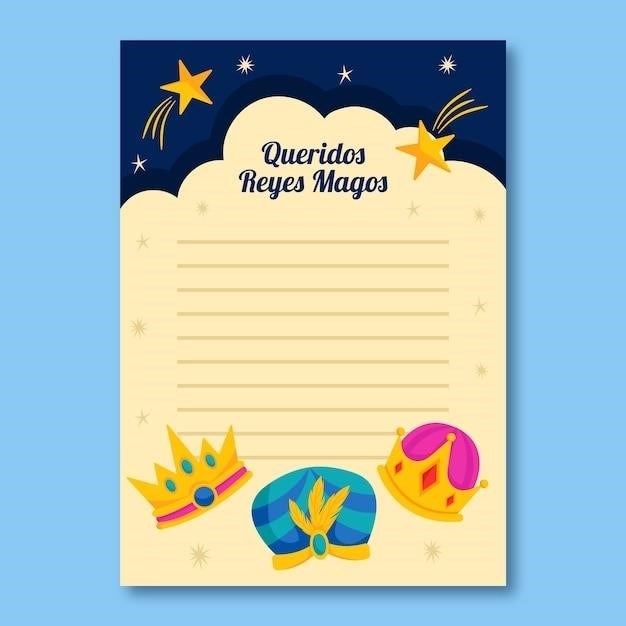The Little Prince PDF⁚ A Timeless Tale
The Little Prince, a novella by Antoine de Saint-Exupéry, has captivated readers worldwide since its first publication in 1943. This enchanting story tells the tale of a young prince who embarks on a journey across various planets, including Earth, seeking the true meaning of life. The Little Prince is a timeless classic that continues to resonate with readers of all ages, offering profound insights into themes of love, friendship, loss, and the importance of seeing the world through the eyes of a child.
The Story of the Little Prince
The Little Prince, a novella by French aristocrat, writer, and aviator Antoine de Saint-Exupéry, is a captivating tale of a young prince from a tiny asteroid who embarks on a journey across the universe. The story is narrated by a pilot who has crash-landed in the Sahara Desert and encounters the Little Prince. The prince’s journey takes him to various planets, each inhabited by unique and peculiar characters. He meets a conceited man, a drunkard, a businessman, a lamplighter, and a geographer, each representing different aspects of human nature and societal values. Along the way, the prince learns about the complexities of human relationships, the importance of love, and the true meaning of life.
The Little Prince’s journey culminates on Earth, where he meets a fox who teaches him the profound lessons of taming and love. The fox explains that true connection is built through mutual understanding and care, and that love requires both giving and receiving. The prince’s experiences on Earth ultimately lead him to a deeper understanding of the universe and the importance of cherishing the simple things in life.
The Little Prince’s Journey
The Little Prince’s journey is a captivating exploration of different worlds and perspectives. It begins on his tiny asteroid, B-612, where he tends to his beloved rose. Driven by a thirst for adventure and a longing for connection, he leaves his home and sets out on a journey across the cosmos. His travels take him to a series of planets, each inhabited by unique characters who represent different aspects of human nature and societal values. He encounters a conceited man obsessed with admiration, a drunkard seeking solace, a businessman preoccupied with numbers, a lamplighter dedicated to a pointless task, and a geographer obsessed with mapping the world.
Each encounter teaches the Little Prince valuable lessons about human behavior and the complexities of life. He witnesses the superficiality of vanity, the destructive nature of addiction, the relentless pursuit of material wealth, and the futility of meaningless tasks. However, he also encounters kindness and generosity, like the lamplighter’s unwavering dedication to his work. The Little Prince’s journey across these planets allows him to gain a broader perspective on the world and to begin questioning the values and priorities of grown-ups.
Themes Explored in The Little Prince
The Little Prince delves into profound themes that resonate with readers of all ages. One of the central themes is the importance of imagination and wonder. The Little Prince’s journey is a testament to the power of imagination, as he sees beauty and meaning in the simplest things, like a drawing of a boa constrictor swallowing an elephant. The story reminds us to embrace our inner child and to never lose our capacity for wonder and curiosity. Another crucial theme is the value of connection and relationships. The Little Prince’s search for a friend and his encounters with various characters highlight the importance of human connection and the need for love and companionship. The story explores the complexities of human relationships, from the fleeting nature of infatuation to the enduring power of friendship.
Furthermore, The Little Prince delves into themes of responsibility and care. The Little Prince’s love for his rose and his dedication to caring for her symbolize the responsibility we have to those we love. His journey also emphasizes the importance of taking care of the planet and its inhabitants. The Little Prince’s journey is a powerful reminder that we all have a responsibility to care for the world around us. Ultimately, The Little Prince is a testament to the enduring power of love, friendship, and the human spirit. It is a story that speaks to the heart and reminds us to cherish the simple things in life.
The Little Prince’s Popularity
The Little Prince has achieved enduring popularity, becoming one of the most beloved and widely read books of all time. It has been translated into over 400 languages and dialects, reaching readers across the globe. Its timeless themes of love, friendship, and the search for meaning resonate with people of all ages and cultures. The book’s enduring appeal can be attributed to its simple yet profound narrative, its charming illustrations, and its universal themes. The Little Prince’s popularity is also due to its accessibility. It is a relatively short book, making it easy for readers of all ages and reading levels to engage with. The book’s simple language and engaging story make it a joy to read for both children and adults. The Little Prince’s popularity is also a testament to its enduring power to inspire and move readers. It is a book that stays with you long after you finish reading it, prompting reflection and introspection.
The Little Prince’s popularity is further evidenced by its widespread adaptation into various forms of media. It has been adapted into numerous stage productions, films, and even video games. These adaptations demonstrate the book’s enduring power to captivate audiences across generations. The Little Prince’s popularity is a testament to its enduring appeal and its ability to touch the hearts of readers worldwide. It is a book that continues to inspire and move readers, reminding us of the importance of imagination, love, and the search for meaning in a complex world.
The Little Prince in Different Languages
The Little Prince’s global reach is evident in its widespread translation. It’s been translated into over 400 languages and dialects, a testament to its universal appeal. This expansive reach allows readers around the world to experience the story’s magic in their native tongues. The Little Prince’s translation into various languages highlights its cultural significance and its ability to transcend linguistic barriers. Each translation brings a unique flavor to the story, reflecting the nuances of the language and culture in which it is presented. This diversity of translation enhances the richness of the text and allows readers to connect with the story on a deeper level. The Little Prince’s translation into languages such as Greater Polish, Silesian, and even Prussian showcases its enduring power to resonate with diverse communities.
The Little Prince’s translation into different languages is a testament to its enduring popularity and its ability to transcend cultural boundaries. It is a book that continues to be cherished by readers around the world, regardless of their native tongue. This widespread translation ensures that the story’s message of love, friendship, and the search for meaning can reach a wider audience, fostering a shared understanding of the universal themes at its core.
The Little Prince as a Play
The Little Prince’s enduring popularity has extended beyond the printed page, finding a successful life on stage. The novella has been adapted into a captivating play, bringing the story’s characters and themes to life for audiences of all ages. The play’s success on Broadway, and its subsequent move to the Nita Mukesh Ambani Cultural Centre, attests to its ability to engage and entertain. The play retains the heart and soul of the original story, while offering a new dimension to its narrative. The Little Prince’s adaptation into a play showcases its versatility and its ability to resonate across different artistic mediums.
The theatrical adaptation allows audiences to experience the story in a unique and immersive way, engaging their senses through live performances, music, and sets. The play’s adaptation has brought the story to a wider audience, introducing a new generation to the timeless themes of love, friendship, and the search for meaning. The play’s success is a testament to the power of The Little Prince’s narrative and its enduring appeal.

The Little Prince in Film
The Little Prince’s journey from page to screen has been a natural progression, captivating audiences with its visual storytelling. The story’s timeless themes and enchanting characters have resonated with filmmakers, resulting in a compelling animated film adaptation. The film, released in 2015, utilizes both traditional animation and stop-motion techniques to bring the Little Prince’s world to life. This unique blend of styles adds a layer of depth and beauty to the visual storytelling, enhancing the story’s emotional impact.
The film follows the Little Prince’s journey through a variety of planets, encountering diverse characters and learning valuable lessons about love, friendship, and the importance of imagination. The film’s success, both critically and commercially, reinforces the enduring appeal of the story, demonstrating its ability to transcend generations and cultures. The Little Prince’s transition to film has further expanded its reach, introducing the story to a wider audience and solidifying its place as a beloved classic.
The Little Prince and Autism
The Little Prince’s unique perspective and social interactions have led some to draw parallels between the character and individuals on the autism spectrum. The Little Prince’s literal interpretations, his struggles with social cues, and his focus on specific interests, such as drawing and caring for his rose, resonate with certain autistic traits. His journey to understand the world around him, often through unconventional means, reflects the challenges individuals with autism may face in navigating social complexities.
The Little Prince’s story, while not explicitly about autism, provides a lens for exploring the themes of difference, acceptance, and the importance of individual perspectives. By highlighting the Little Prince’s unique way of seeing the world, the story encourages empathy and understanding for individuals who might think and communicate differently. The Little Prince’s journey can be seen as a metaphor for the challenges and triumphs of those with autism, promoting inclusivity and celebrating neurodiversity.
The Little Prince’s Impact on Literature
The Little Prince’s impact on literature is undeniable, transcending its status as a children’s book to become a global literary phenomenon. The novella’s simple yet profound prose, combined with Saint-Exupéry’s poignant illustrations, has inspired countless authors and illustrators, influencing the style and themes of subsequent works. Its timeless themes of love, friendship, loss, and the search for meaning have resonated across generations, making it a staple in classrooms and homes worldwide.
The Little Prince’s influence can be seen in the rise of philosophical fiction for children, where complex ideas are presented through engaging narratives. It also paved the way for more introspective and imaginative stories that explore the inner world of characters, often through allegorical journeys and fantastical settings. Its enduring popularity has cemented its place as a cornerstone of literary history, serving as a reminder of the power of simple stories to touch hearts and inspire minds.
The Little Prince’s Legacy
The Little Prince’s legacy extends far beyond the pages of the book itself. It has become a cultural icon, inspiring countless adaptations, interpretations, and tributes. The novella’s enduring popularity has ensured its continued relevance, with new generations discovering its timeless message of love, friendship, and the importance of seeing the world with childlike wonder.
The Little Prince’s influence can be seen in art, music, film, and theater, with artists drawing inspiration from its characters, themes, and imagery. Its universal appeal has transcended language and cultural boundaries, making it a global phenomenon cherished by people of all ages. The Little Prince’s legacy is a testament to the enduring power of storytelling to touch hearts and inspire minds, leaving a lasting impact on generations to come.
The Little Prince’s Availability
The Little Prince is readily available in various formats to cater to diverse reading preferences. Whether you prefer a physical copy, an e-book, or an audiobook, accessing this timeless tale is effortless. Numerous online platforms offer digital versions for convenient reading on e-readers, tablets, and smartphones. Moreover, libraries worldwide stock the book, providing access to its captivating story for free.
For those seeking a personalized reading experience, the Little Prince is also available in a multitude of languages, ensuring its message reaches a global audience. The accessibility of this beloved novella, both in physical and digital formats, makes it a treasure readily available for readers of all ages and backgrounds to enjoy.
The Little Prince’s Critical Reception
The Little Prince has garnered widespread critical acclaim since its publication, becoming a beloved classic recognized for its universal appeal. Critics praise its poignant exploration of profound themes, such as the nature of love, friendship, and the importance of imagination. The book’s simple yet evocative language, coupled with Saint-Exupéry’s captivating illustrations, has been lauded for its ability to connect with readers of all ages.
The Little Prince is often cited as a masterpiece of children’s literature, yet its enduring popularity extends beyond this categorization. Critics acknowledge its depth and complexity, recognizing its ability to resonate with both children and adults. Its timeless message continues to inspire and provoke thought, solidifying its position as a literary work that transcends generations.
The Little Prince’s Place in World Literature
The Little Prince occupies a unique and significant place in world literature. Its timeless themes, captivating narrative, and enduring popularity have cemented its status as a literary masterpiece. Translated into over 400 languages, it has become a global phenomenon, transcending cultural and linguistic boundaries. The book’s simple yet profound message about the importance of love, friendship, and imagination has resonated with readers worldwide, solidifying its position as a universal story that speaks to the human condition.
The Little Prince’s impact on literature extends beyond its own success. Its influence can be seen in countless other works that explore similar themes of childhood wonder, the search for meaning, and the power of human connection. Its enduring popularity serves as a testament to its enduring power and its ability to continue to touch the hearts and minds of readers across generations.




Be the first to reply